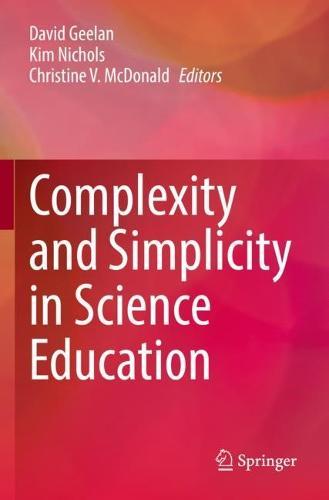Overview
This edited volume brings together a broad range of international science education studies, focusing on the interplay of teaching and learning science. It recognizes the complexity present in today’s education, associated with major science related issues faced by society, such as climate change, diseases and pandemics, global conflicts over energy, food and water. The studies discussed in this volume are focused on presenting different opportunities to teach these convoluted matters in order to find simplicity within the complexity and make it accessible to learners. They bring together the challenges of preparing the students of today to become scientifically informed citizens of tomorrow.
Full Product Details
Author: David Geelan ,
Kim Nichols ,
Christine V. McDonald
Publisher: Springer Nature Switzerland AG
Imprint: Springer Nature Switzerland AG
Edition: 2021 ed.
Weight: 0.355kg
ISBN: 9783030790868
ISBN 10: 303079086
Pages: 218
Publication Date: 27 January 2023
Audience:
Professional and scholarly
,
Professional & Vocational
Format: Paperback
Publisher's Status: Active
Availability: Manufactured on demand

We will order this item for you from a manufactured on demand supplier.
Author Information
David Geelan has taught secondary school science in several Australian states and been a science teacher educator in Papua New Guinea, Canada and Australia. He is President of the Australasian Science Education Research Association (ASERA) and a former Editor of Research In Science Education (RISE). David's research interests include qualitative research methods in education, educational technology and the ways in which teachers explain scientific concepts to students. Kim Nichols is currently an Associate Professor of science education at the University of Queensland School of Education and co-editor of Research in Science Education. Drawing on her past experiences as a National Health and Medical Research Centre funded scientist at Flinders University Centre for Neurosciences and Adelaide University Medical School, her research focuses on making the complexities of science accessible to learners through inquiry-based representational practices and collaborative reasoning. Kim’s expertise has been commissioned by the Queensland Department of Education to develop online learning modules for teachers on inquiry and representational practices in science and to work with schools in their Advancing Science Technology Engineering and Mathematics (STEM) in Primary Schools initiative. Kim currently leads an Australian Research Council funded collaborative project in partnership with the Queensland Department of Education, Queensland Museum Network, Shell QGC and Queensland regional schools to develop a multi-systemically resilient model of community-based STEM professional learning for teachers. Christine McDonald’s research primarily focuses on how the nature of science is conceptualised by teachers and students, and represented in science education curriculum materials. She has also recently led the Australian leg of a large-scale, international study investigating students’ views of scientific inquiry, and her commissioned review of best practice in Science, Technology, Engineering and Mathematics (STEM) education underpinned the development of the Queensland Department of Education STEM Strategy. She is a past Director of the Australasian Science Education Research Association, and is currently an Associate Editor of the Journal of Research in Science Teaching (USA).



